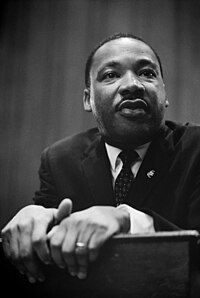
Martin Luther King Jr. was an American Christian minister, activist, and political philosopher who was one of the most prominent leaders in the civil rights movement from 1955 until his assassination in 1968. A Black church leader and a son of early civil rights activist and minister Martin Luther King Sr., King advanced civil rights for people of color in the United States through the use of nonviolent resistance and nonviolent civil disobedience against Jim Crow laws and other forms of legalized discrimination.

National holidays in the United States are 11 calendar dates designated by the U.S. federal government as official holidays. On these days non-essential national offices are closed although the employees receive pay.

In the United States, public holidays are set by federal, state, and local governments and are often observed by closing government offices or giving government employees paid time off. The federal government does not require any private business to close or offer paid time off, as is the case for most state local governments, so employers determine which holidays to observe.

Coretta Scott King was an American author, activist, and civil rights leader and the wife of Martin Luther King Jr. from 1953 until his death. As an advocate for African-American equality, she was a leader for the civil rights movement in the 1960s. King was also a singer who often incorporated music into her civil rights work. King met her husband while attending graduate school in Boston. They both became increasingly active in the American civil rights movement.
Lee–Jackson–King Day was a holiday celebrated in the Commonwealth of Virginia from 1984 to 2000 as a combination of Lee–Jackson Day and Martin Luther King Jr. Day. Beginning in 2000 the state observed them as two distinct holidays.

Martin Luther King III is an American human rights activist, philanthropist and advocate. The elder son of civil rights leaders Martin Luther King Jr. and Coretta Scott King, King served as the 4th President of the Southern Christian Leadership Conference from 1997 to 2004.

Lee–Jackson Day was a state holiday in the U.S. Commonwealth of Virginia, commemorating Confederate commanders, Robert E. Lee and Stonewall Jackson. Its observation was eliminated in 2020, replaced by Election Day as a state holiday.

The Martin Luther King, Jr. Memorial is a national memorial located in West Potomac Park next to the National Mall in Washington, D.C., United States. It covers four acres (1.6 ha) and includes the Stone of Hope, a granite statue of Civil Rights Movement leader Martin Luther King Jr. carved by sculptor Lei Yixin. The inspiration for the memorial design is a line from King's "I Have a Dream" speech: "Out of the mountain of despair, a stone of hope." The memorial opened to the public on August 22, 2011, after more than two decades of planning, fund-raising, and construction.

The Uniform Monday Holiday Act is an Act of Congress that moved permanently to a Monday two federal holidays in the United States — Washington's Birthday and Memorial Day — and that made Columbus Day a federal holiday, also permanently on a Monday. This created long weekends with three days off ending with the holidays, such as Memorial Day Weekend.
James Edward Orange, also known as "Shackdaddy", was a leading civil rights activist in the Civil Rights Movement in America. He was assistant to Martin Luther King Jr. in the civil rights movement. Orange joined the civil rights marches led by King and Ralph Abernathy in Atlanta in 1963. Later he became a project coordinator for Southern Christian Leadership Conference, drawing young people into the movement.

Robert E. Lee Day is a state holiday in parts of the Southern US, commemorating the Confederate general Robert E. Lee. It is rooted in the rise of the Lost Cause myth prevalent throughout the Southern United States, as Lee was a central figure in Lost Cause mythology due to his social status, military exploits, and personality.
Idaho Human Rights Day is a state holiday recognized only in the U.S. state of Idaho. Governor Cecil Andrus signed compromise legislation on April 10, 1990, making Idaho the nation's 47th state to honor slain civil rights leader Martin Luther King Jr. with an official state holiday. The holiday, defined by the legislation as Martin Luther King, Jr. - Idaho Human Rights Day, is celebrated on the third Monday in January, the same day as the federal Martin Luther King, Jr. Day holiday, which was first celebrated in 1986.

Susan B. Anthony Day is a commemorative holiday to celebrate the birth of Susan B. Anthony and women's suffrage in the United States. The holiday is February 15—Anthony's birthday.

Presidents' Day, officially Washington's Birthday at the federal governmental level, is a holiday in the United States celebrated on the third Monday of February. It is often celebrated to honor all those who served as presidents of the United States and, since 1879, has been the federal holiday honoring Founding Father George Washington, who led the Continental Army to victory in the American Revolutionary War, presided at the Constitutional Convention of 1787, and was the first U.S. president.

"By the Time I Get to Arizona" is a song by American hip hop group Public Enemy from their 1991 album Apocalypse 91... The Enemy Strikes Black. The song was written by frontman Chuck D in protest of the state of Arizona, where governor Evan Mecham had canceled Martin Luther King Jr. Day and the people voted against its reintroduction.

In the United States there are a number of observed holidays where employees receive paid time off. The labor force in the United States comprises about 62% of the general population. In the United States, 97% of the private sector businesses determine what days this sector of the population gets paid time off, according to a study by the Society for Human Resource Management. The following holidays are observed by the majority of US businesses with paid time off: New Year's Day, New Year's Eve, Memorial Day, Independence Day, Labor Day, Thanksgiving, the day after known as Black Friday, Christmas Eve and Christmas. There are also numerous holidays on the state and local level that are observed to varying degrees.

A United States federal statute honoring the Birthday of Martin Luther King Jr. and his work in the civil rights movement with a federal holiday was enacted by the 98th United States Congress and signed into law by President Ronald Reagan on November 2, 1983, creating Martin Luther King Jr. Day. The final vote in the House of Representatives on August 2, 1983, was 338–90 with 5 members voting present or abstaining, while the final vote in the Senate on October 19, 1983, was 78–22, both veto-proof margins.
March On For Voting Rights was a mass mobilization organized by civil rights leaders in response to Senate Republicans blocking the For The People Act. On August 28, the 58th anniversary of Martin Luther King Jr.'s historic March on Washington, activists marched on cities across America to demand that the vision of MLK's "I Have a Dream" speech be deferred no longer.



















